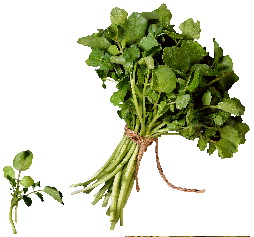Naturopathic health
Watercress health benefits
Watercress researchEating watercress could help protect against cancer and be particularly beneficial to smokers, according to a new study (February 2007). The benefits of eating watercress were especially notable
among smokers, the study found
It found the salad leaf contains ingredients that help prevent damage to the body's cells and DNA. The research involved 30 men and 30 women, half of whom were smokers. They ate 85g of watercress a day for eight weeks - the equivalent of a small bag of pre-prepared salad - in addition to their regular diet. The benefits of eating watercress were especially notable among smokers, the study found. This could be because smokers had significantly lower antioxidant levels at the start of the study compared with non-smokers, owing to their habit, it said. Damage to DNA is considered by experts to be an important trigger in the development of cancer. The results of blood tests on the participants showed a 22.9 per cent reduction in DNA damage to white blood cells. The researchers, from the University of Ulster, also noted a 100 per cent increase in levels of the molecule lutein and a 33 per cent rise in beta-carotene, both of which have antioxidant properties. Antioxidants help cells defend themselves against damage. The research, which was funded by British watercress suppliers, suggested that increased concentrations of carotenoids could improve the antioxidant effects. Carotenoids are naturally occurring food pigments that contain vitamins. They concluded: "The results support the theory that consumption of watercress can be linked to a reduced risk of cancer via decreased damage to DNA and possible modulation of antioxidant status by increasing carotenoid concentrations." According to ITN news ,Karol Sikora, professor of cancer medicine at Imperial College, said the claims were "grossly overstated
|
Research homeHerbal remedies
|
|
|
|
||
|
|
||
|
Suggested reading: |
|
If your starting to move towards a healthy diet and you want to take a major step forward then a detoxification programme can make a big difference. Click on the link below to find out more. Healthy Recipes Juicing SupplementsBach Flower Herbal Acupuncture Homeopathy DetoxificationMassage Qi Gong Nutrition & Diet Iridology Tissue Salts |

[Herbal Remedies][Alternative Treatments][Naturopathy][Contact][Lifestyle][Home][Research][Site Map]
Sponsored by Organic Herbal Remedies - Love Life, Love Herbs





